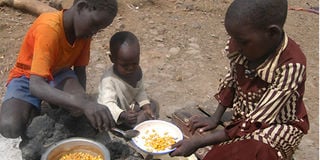Ill-conceived sanctions endanger Africa and the international system

Children share yellow maize in Nginyang' where people now rely on relief food. Families are going for days without food as famine ravages the area.
The day after the Russian invasion of Ukraine, an overwhelming majority of African states justly condemned it as an imperialist act.
Martin Kimani, the permanent representative of Kenya to the United Nations, managed to capture world headlines with his eloquent speech highlighting the parallel tragedies and challenges faced by postcolonial Africa and post-Soviet states.
Mr Kimani exposed hollow Russian rhetoric which, if taken to its logical end, would flood the world with ceaseless conflict.
Mr Kimani, and much of Africa’s diplomatic corps, basked in rightfully earned accolades for taking a principled stand in defence of the rules-based international system.
With the accolades subsided, Africa’s support in this crisis has been taken as a given with its needs and challenges forgotten.
The West has expected unconditional support for their initiatives and is ignoring the reverberations of these policies, especially in food security.
A once-in-a-century pandemic followed by war and global inflation has created an ominous surge in food prices, which the West is not substantively engaging with.
If Africa’s existential needs are not addressed, the broadly supportive mood will quickly turn against the West.
Russia’s invasion of Ukraine has aggravated African food insecurity with fertiliser price hikes and the impediment of maritime traffic in the Black Sea.
Russia has intentionally weaponised this food insecurity for its own geopolitical ends and directly spreads hunger through its abrogation of the Black Sea agreement on grain exports.
The international community must not reward this behaviour, but it should also be intelligent with its response.
A foolish response, no matter how well-intentioned, will harm Africa and the entire international system.
The truth is the West’s strategy against Russia is fundamentally flawed.
Fertiliser exports are a minuscule amount of the Kremlin’s budget, compared with 37 per cent accounted for by energy-export revenues.
These industries are not under the direct control of Kremlin-backed oligarchs, are not easily expropriated, and lack fungible assets useful to Russia’s war effort. Nevertheless, the sanctions persist despite the fact they are vital to the food security of hundreds of millions of people, with Africa importing vast quantities of this fertiliser.
Prices are already up by 30 per cent from their pre-war levels. Whereas much talk has gone to the need to free cereal movement from Ukraine, not enough attention is given to fertiliser as a core source of food security in developing countries.
To some degree, the West does recognise this reality as fertiliser and food sales are not directly sanctioned. This only makes subsequent actions even more unconscionable.
The West has cleverly used legal workarounds to impede the sale of Russian food and fertiliser to avoid direct scrutiny and bypass due-process and due-diligence mechanisms. Restrictions have been placed on non-sanctioned cargo movements, insurance, shipping and individuals (some of whom are only ethnically Russian and haven’t been associated with Russia for years).
The result is a de-facto sanction on food and fertiliser, which dodges legal and ethical mechanisms of scrutiny and redress.
This fundamental strategic problem is compounded by Western hypocrisy which may fatally undermine its credibility. Europe’s need for energy is at the centre of discussions and policy, while Africa’s need for food is tragically forgotten.
While Europe maintains its legally dubious, but no less zealous, obstruction of Russian fertiliser exports, Europe acts in consideration of its own energy interests. European purchases of Russian coal were not halted for months until August.
Europe won’t stop buying Russian oil until December even as imports climbed. It was ultimately Russia that shut off Europe’s gas after months, not Europe. All of this is despite energy exports supporting Russia’s war machine while food and fertiliser are insignificant in comparison.
Ultimately nobody will win with the current arrangement of counterproductive sanctions, not even the comparatively insulated West. Food insecurity will create political instability as it did with the Arab Spring in 2011. The predictable consequences of food poverty will result in economic migration, mostly to Europe.
We can even roughly calculate how much; a UN World Food Programme study found an increase in emigration by 1.9 per cent for every one per cent increase in food insecurity. Millions will flee food insecurity and further strain the international system.
Blocking the export of Russian food and fertilisers, regardless of the legal mechanism, is straining international solidarity with little gain in return. The UN Secretary-General has already called for the removal of these, and all other barriers, to food importation.
Senegalese President Macky Sall and African Union chairperson Moussa Faki Mahamat already broke ranks over the issue of food security by traveling to bargain with Putin directly. There is no practical choice between starvation and treaty obligations.
Above all, it is morally unacceptable that millions of innocent bystanders are being punished for backing the international system by supporting democracy against aggression.
People should have access to food, and it is especially egregious that countries that have condemned the invasion of Ukraine, most of whom have the least means of redressing structural food insecurity issues, are facing starvation.
If the only reward for helping the West and upholding the international system is starvation, then the system is doomed.
The West must come to terms with present circumstances and not allow perfection to be the enemy of the good. Continue to support Ukraine on the battlefield in every way possible and act in the defense of democracy to ensure Russia’s defeat.
But also loosen sanctions that restrict Russian food and fertilizer exports. If the West does not, it will lose African goodwill, the international system will be fatally undermined, millions will starve, millions will flee, and Russia will barely notice a difference.
Dr Kituyi is a former UNCTAD secretary-general. A version of this article was presented at The Brussels Press Club conference on the impact of sanctions on Russia on global food security.





